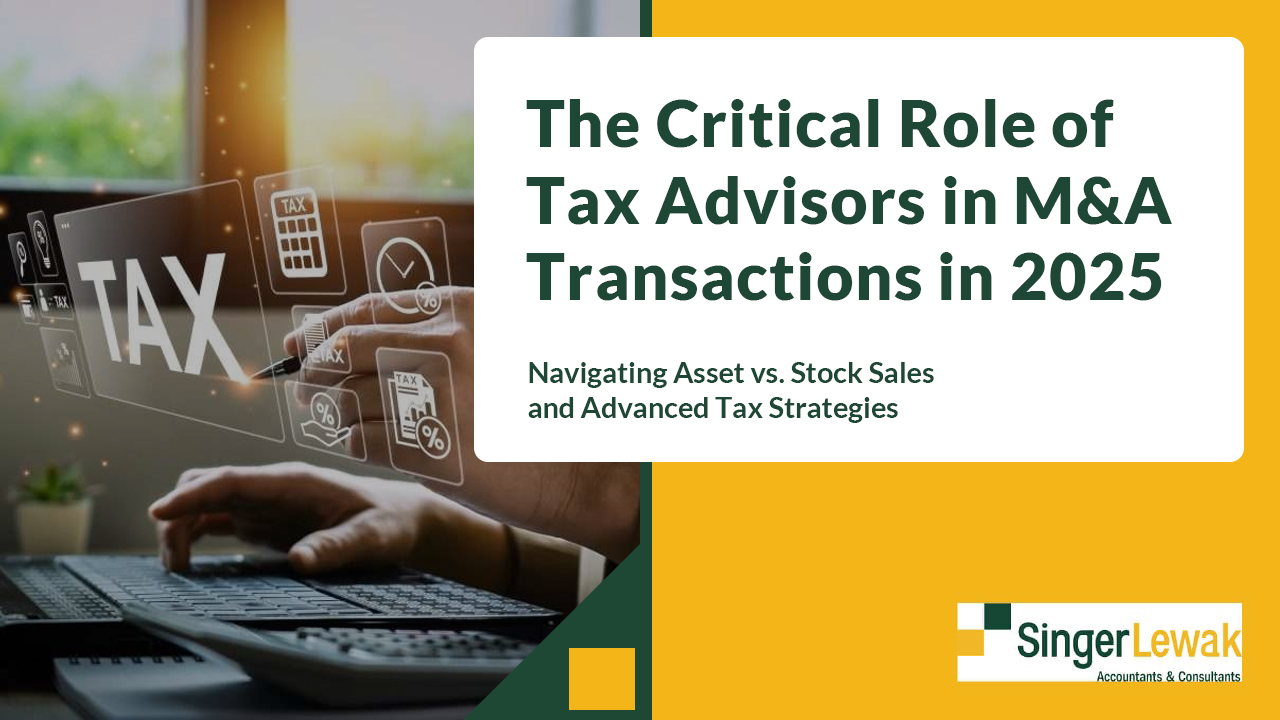As the economy stabilizes in 2025, merger and acquisition (M&A) activity is rebounding, particularly in the lower-middle market, where strategic acquisitions and exits are accelerating. In this environment, one of the most pivotal decisions in any transaction is how to structure the deal: as an asset sale, where the buyer purchases specific parts of a company, like equipment or contracts, or a stock sale where the buyer acquires the target company’s shares, taking over the entire business entity. While legal and strategic considerations play a role, income tax implications often heavily weigh in as well.
Asset vs. Stock Sales: Why Structure Matters
The choice between an asset sale and a stock sale carries significant tax consequences for both parties.
- Asset Sales: In an asset sale, Buyers acquire selected assets and assume specific liabilities. By purchasing the assets directly, the Buyer is typically allowed to step-up the basis in these acquired assets, which allows for future tax deductions through depreciation and amortization of said assets. However, asset sales can often result in a higher tax liability for Sellers, specifically because the sale of particular assets may cause the Seller to recognize ordinary income, as opposed to capital gain, on the sale. For shareholders in a C corporation, the pain is compounded by double taxation, meaning the gain will be recognized: once at the corporate-level and again when proceeds are distributed to shareholders.
- Stock Sales: Typically, a stock sale is more favorable to Sellers, as Sellers are generally taxed at long-term capital gains rates and avoid the complexity of transferring individual assets; however, Buyers may be opposed to stock sales as they will likely lose the step-up in basis.
This structural tension is a common negotiation hurdle. With key provisions of the Tax Cuts and Jobs Act (TCJA), such as bonus depreciation, set to expire in 2025, the stakes are even higher.
Gross-Up Reimbursements: Bridging the Tax Gap
When a Buyer prefers an asset sale but the Seller faces a higher tax burden, a gross-up reimbursement payment can help bridge the gap. This additional payment offsets the Seller’s incremental tax liability, ensuring they receive the same net after-tax proceeds as they would in a stock sale.
For example, in a $50 million transaction, if the Seller’s effective federal tax rate is 35% in an asset sale versus 20% in a stock sale, the Buyer may need to increase the purchase price to make the Seller whole. The calculation of a gross-up payment is highly technical and typically requires a detailed understanding of the Seller’s tax profile, including:
- Accounting method of target entity (cash vs. accrual)
- Tax basis in assets and shareholder tax basis in stock
- Federal and state effective tax rates for target and shareholders
- Presence of tax attributes (e.g., NOLs, credits)
- Characterization of gain (ordinary vs. capital)
This modeling must also account for the recursive nature of gross-up payments since the reimbursement itself may be taxable. Once complete, this tax model can serve as a powerful negotiation tool helping both buyers and sellers make informed decisions.
Advanced Structuring: F-Reorgs and Section 338(h)(10) Elections
Beyond gross-ups, advanced tax strategies can further optimize deal outcomes:
- F-Reorganizations: A Tax-Free F-Reorganization allows an S corporation to restructure, often into an LLC, while preserving tax attributes. Depending on circumstances, this would enable the Seller to largely receive capital gains treatment while allowing the Buyer to treat the deal as an asset purchase, securing a step-up in basis. A key advantage is that Buyers purchase equity for legal purposes, avoiding individual asset title transfers, simplifying legal and administrative work. F-Reorganizations may also resolve S corporation eligibility issues, ideal for family-owned businesses.
- Section 338(h)(10) Elections: Commonly used for S corporations or C corporation subsidiaries, this election treats a stock purchase as an asset sale for tax purposes, delivering a step-up in basis to the buyer without asset title transfers. Depending on specific circumstances, Sellers can often receive capital gains treatment on all or a large portion of the gain, balancing both parties’ interests.
These strategies are highly technical and require careful planning and execution, ensuring compliance with IRS regulations, and coordination with legal counsel.
Best Practices for M&A Success
To maximize value and minimize risk in today’s M&A environment, businesses should:
- Engage Tax Advisors Early: Don’t wait until the LOI is signed. Early tax modeling can help optimize negotiations and shape deal terms.
- Model Multiple Scenarios: Compare asset vs. stock sales, including gross-up calculations, to make informed decisions.
- Leverage Advanced Structuring: Consider F-Reorganizations or Section 338(h)(10) elections to align tax outcomes with deal goals.
- Integrate Tax with Strategy: Tax planning should support broader business objectives, not operate in a silo.
Conclusion
In today’s fast-moving M&A environment, particularly in the lower-middle market, tax advisors are not just behind-the-scenes contributors, they are essential strategic partners. The right tax guidance can mean the difference between a deal that merely closes and one that delivers maximum value with minimal friction.
At SingerLewak, we bring deep expertise and a hands-on approach to every stage of the transaction process. With a focus on clarity, compliance, and creativity, our M&A tax team helps clients navigate complexity, avoid surprises, and close deals with confidence. If you’re preparing for a transaction in 2025 or beyond, SingerLewak is here to help you achieve the best possible outcome.



